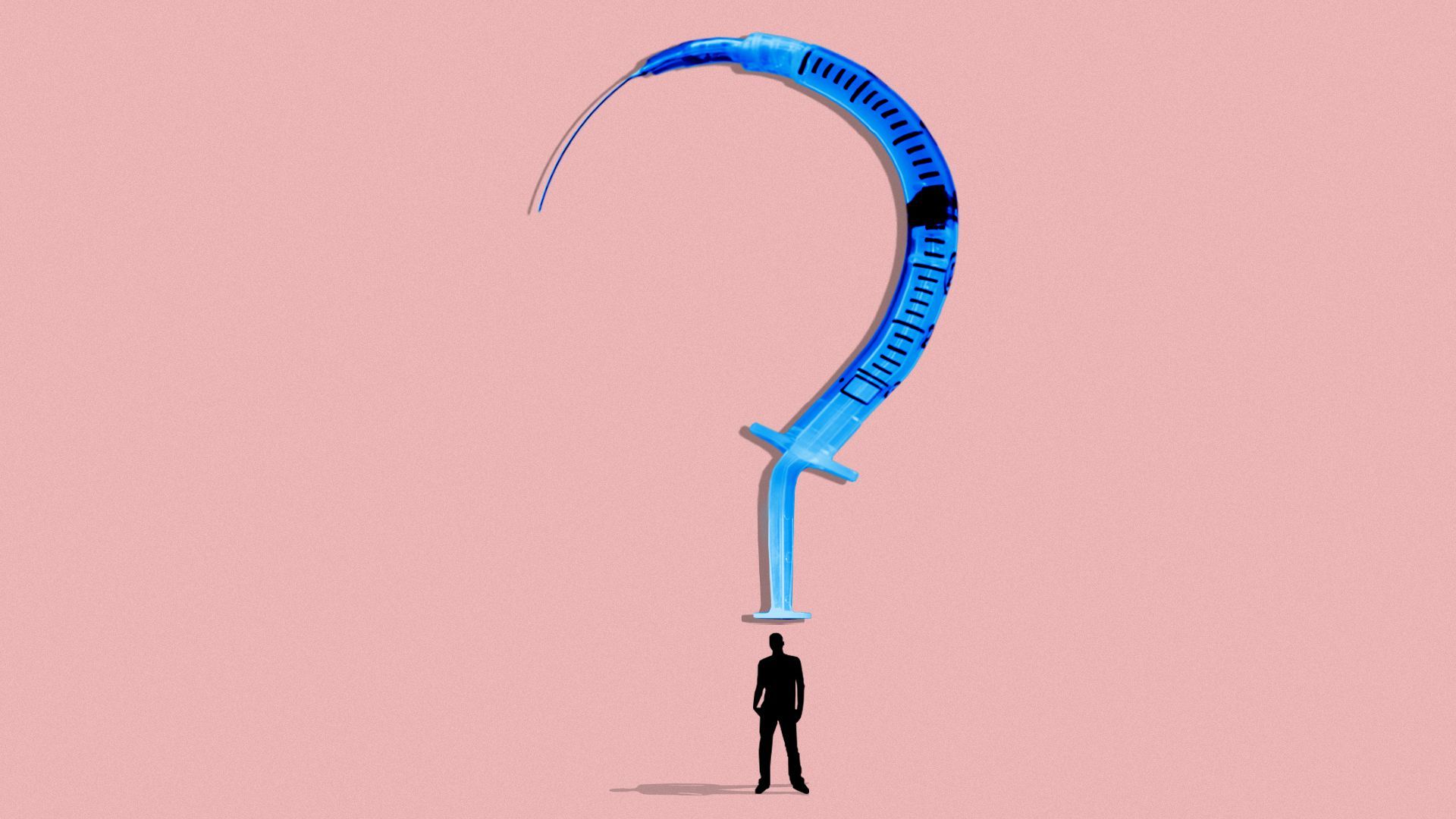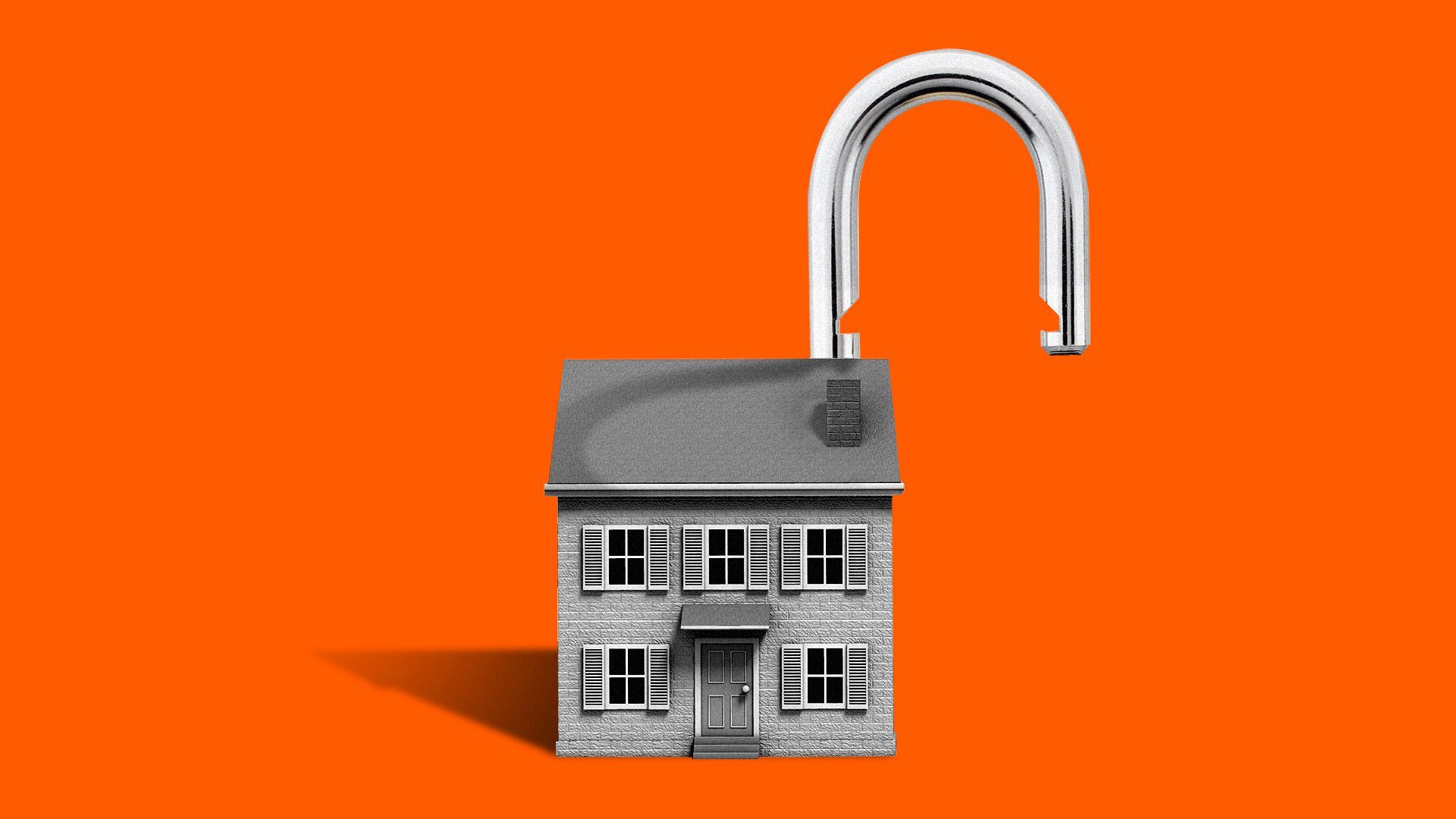| | | | | | | Presented By PhRMA | | | | Vitals | | By Caitlin Owens ·Mar 15, 2021 | | Good morning. Today's word count is 1,207, or a 5-minute read. | | | | | | 1 big thing: Concern about Republican vaccine hesitancy is growing |  | | | Illustration: Annelise Capossela/Axios | | | | Polling and public officials are increasingly sounding the alarm about one group of Americans that remains stubbornly resistant to the idea of receiving a coronavirus vaccine: Republicans. The big picture: Vaccine enthusiasm has increased over the last few months, but a giant partisan gap remains. Driving the news: Nearly half of Republican men — 49% — say they won't choose to be vaccinated if a vaccine is available to them, according to a recent NPR/PBS NewsHour/Marist survey. - Among those who said they supported Trump in 2020, 47% said they wouldn't choose to be vaccinated.
- In contrast, 6% of Democratic men and 10% of Biden supporters said they wouldn't get the shot.
- 25% of Black respondents, 28% of white respondents and 37% of Latino respondents said the same.
What they're saying: NIAID director Anthony Fauci yesterday told "Fox News Sunday" that "it would make all the difference in the world" if former President Trump urged his supporters to take the coronavirus vaccine, Axios' Orion Rummler reports. - "I'm very surprised that the high percentage of Republicans say they don't want to get vaccinated," Fauci said. "I don't understand where that's coming from. This is not a political issue. This is a public health issue."
- Georgia Gov. Brian Kemp said on Friday that the state is seeing vaccine hesitancy among white Republicans, and said partnerships between pharmacies and churches or civic clubs will be important, CNN's Kaitlan Collins reports.
The bottom line: Who the vaccine holdouts are doesn't change the math of getting to herd immunity. But it does strongly determine who the most effective vaccine messengers will be. - "We recognize, as a Democratic administration with a Democratic President, that we may not be the most effective messenger to communicate with hardcore supporters of the former President," White House press secretary Jen Psaki said on Friday.
|     | | | | | | 2. What we learned about ourselves in lockdown |  | | | Illustration: Aïda Amer/Axios | | | | Americans learned over the past year that they kind of like working and socializing from home, and might keep these parts of their pandemic lifestyles going even after offices, bars and restaurants become options again, according to new Harris Poll data. Why it matters: Even after the threat from COVID-19 recedes, we know life won't simply return to its pre-pandemic shape, Axios' Sam Baker writes. - This year has altered everything from our media diets to our sense of work-life balance to our ideas of what's fun.
By the numbers: 75% of Americans said they learned during the pandemic that they prefer socializing in small groups at home over going out to bars. - 59% said they didn't miss going out to bars to socialize as much as they thought they would, and 60% said they've learned over the past year "how much I love entertaining at home in small pandemic pods."
Americans have also gotten used to working from home, according to the Harris Poll data, which were pulled from a comprehensive report combining multiple surveys over the past year. - 67% said their lifestyles have gotten healthier while working from home, and 55% said they've discovered that they didn't miss the office as much as they thought they would.
Go deeper: Read the full Harris Poll report on Americans' changing attitudes over the past year. |     | | | | | | 3. Florida's pandemic response gets second look | | After a solid year of living with a pandemic, the national press is beginning to ask the question that even Democrats have been quietly pondering in the Sunshine State: Was Gov. Ron DeSantis' pandemic response right for Florida? Don't forget: More than 32,000 Floridians have died, a number the state's leaders rarely acknowledge, but Florida's death rate is no worse than the national average — and better than some states with tighter restrictions, Axios Tampa Bay's Ben Montgomery and Selene San Felice report. The Los Angeles Times compared Florida and California's responses: - "California imposed myriad restrictions that battered the economy, and have left most public school students learning at home for a year. ... Florida adopted a more laissez-faire approach decried by public health experts — allowing indoor restaurant dining, leaving masks optional and getting children back in classrooms sooner."
- But, it points out, "If California had Florida's death rate, roughly 6,000 more Californians would be dead from COVID-19 ... if Florida had California's death rate, roughly 3,000 fewer Floridians would be dead."
On Sunday's front page, the New York Times explored the positives — from the booming real-estate market to Florida's low unemployment rate — of an early reopening: "Much of the state has a boomtown feel," writes Patricia Mazzei, "a sense of making up for months of lost time." The big picture: Much of the public part of DeSantis' pandemic response feels more and more like an audition for a 2024 presidential run, which Politico's Marc Caputo has noted. |     | | | | | | A message from PhRMA | | We are committed to being a part of the solution | | |  | | | | America's biopharmaceutical companies are committed to ending the pandemic by: - Continuing to develop treatments and vaccines to combat COVID-19,
- Working closely with governments, insurers and others to make sure vaccines and treatments are accessible and affordable.
| | | | | | 4. America's unequal return to classrooms |  | | | Illustration: Sarah Grillo/Axios | | | | Most American kids have returned to some form of in-person school by now — but low-income school districts are paying a higher price for it, Axios' Erica Pandey and David Nather report. The big picture: Preparing for testing, infrastructure improvements and distancing has cost school districts tens of millions of dollars. And poorer districts have had to freeze hiring and cut entire programs to make it work. What's happening: To reopen safely, education officials say, schools need to be able to pay for measures like COVID testing, masks, new ventilation systems and additional staff and space to reduce class sizes and keep students safely apart. - And while federal aid has helped, schools still have to make sacrifices and shoulder unexpected costs. It's often worse in smaller, more rural districts, and in long underfunded urban districts.
"Concerns about equity are very real," says Mike Magee, CEO of Chiefs for Change, a coalition of state and local education leaders. - In urban — and often disadvantaged — school districts across the U.S., the effects of chronic underfunding are potentially making the costs of reopening higher, he says.
- "The people who have been able to get kids back more easily are private schools or charter schools," giving an advantage to wealthy families, says Margaret Spellings, former education secretary under George W. Bush.
Go deeper. |     | | | | | | 5. Facebook's plan to help get people vaccinated | | Facebook CEO Mark Zuckerberg said this morning that Facebook is building a tool to connect people to information about where and when to get a COVID-19 vaccine, Axios' Sara Fischer reports. The big picture: Facebook has been blamed for the spread of anti-vaccination misinformation during the COVID-19 crisis and beyond. Details: In a blog post, Zuckerberg said the company aims to help bring 50 million people "one step closer to getting vaccinated" by helping people "learn more about COVID-19 vaccines and find out when and where" they can get one. - To make this possible, Facebook has partnered with Boston Children's Hospital to offer a tool that helps Facebook users identify places nearby to get a vaccine.
- It will also deploy official chatbots on its messaging app WhatsApp to get people registered for vaccinations with health authorities and governments.
- Zuckerberg said Facebook will make real-time aggregate trends on "COVID-19 vaccinations, intent to get vaccinated, and reasons for hesitancy" available to public officials, like the World Health Organization, to help inform an equitable rollout of the vaccine.
Be smart: It's made more efforts in recent months to ensure more people access accurate information about the COVID-19 vaccine as it become more accessible around the globe. - In a reversal from its previous position, Facebook said last month that it will take tougher action during the pandemic against claims that vaccines, including the COVID-19 vaccination, are not effective or safe.
|     | | | | | | 6. Catch up quick |  | | | Illustration: Aïda Amer/Axios | | | | States and cities are facing a rising number of drug overdoses that health officials say have increased during the coronavirus pandemic, Orion reports. United Airlines CEO Scott Kirby knew he needed to prepare for a global pandemic after watching how quickly the coronavirus spread in Italy — even as he was told he was overreacting, he said in an interview Sunday with Axios Re:Cap. North Carolina's Duke University on Saturday ordered all undergraduate students to stay in their dorm rooms until March 21, citing a "rapidly escalating number of COVID cases" driven by students. Pandemic lockdowns left thousands of American kids in homes with high levels of lead exposure, Axios' Bryan Walsh reports. Italy will be placed under lockdown from March 15 through at least Easter weekend, as coronavirus cases continue to rise across the country, Italian health officials announced on Friday. |     | | | | | | A message from PhRMA | | We are committed to being a part of the solution | | |  | | | | As we usher in a new Congress and new administration, we can all agree that people need quality, affordable health coverage that works when they need it. - We are focused on solutions that help patients better afford their medicines and protect access to innovation today and in the future.
| | | | | | Axios thanks our partners for supporting our newsletters.
Sponsorship has no influence on editorial content. Axios, 3100 Clarendon Blvd, Suite 1300, Arlington VA 22201 | | | You received this email because you signed up for newsletters from Axios.
Change your preferences or unsubscribe here. | | | Was this email forwarded to you?
Sign up now to get Axios in your inbox. | | | | Follow Axios on social media:    | | | | | |
Post a Comment
0Comments